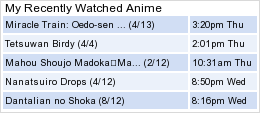Postby Maokun » Wed Sep 26, 2012 9:44 pm
I went to a special cinema event and watched back to back Ame and Yume, Wolf Children and Children Who Chase Lost Voices from Deep Below (very light spoilers ahead.)
Wolf Children can be summed up by one word: Beautiful. It's magnificently pleasant on the eyes and the story is one of the most heart-warming things you'll ever see. And the feels, guys, all those feels; I was on the brink of tears almost through the whole movie, though the tears threats did not always come from sadness, but also from wonder, and happiness and just plain joy. In a stark change from the pretty and cleverly designed artificial world of Summer Wars (I'd normally say "beautiful" but I seriously can't use that word lightly while in consideration of this movie) we are now regaled with the magnificent vistas of nature through the seasons which confirm any suspicions about Mamoru Hosoda's ability to find and depict beauty in everything.
In spite of what the title may suggest, this is not a story about wolf children (though wolf children are prominently featured,) but about an incredibly strong woman -their mother- who has quickly climbed to the ranks of my favourite anime characters. It's a story about the hardships a single mother has to go through to raise her kids -hardships that are multiplied tenfold when said kids are half-werewolves- from the initial financial struggles through the more emotionally difficult woes of seeing kids grow up and the necessity to adjust one's expectations and instinct to care for and protect versus the obligation to allow individuality and freedom of spirit to develop.
It's also a story about a woman moving from a psychologically oppressive but comfortable urbanite life to the liberating but physically and mentally taxing life of sustaining yourself in the country. Controversially, I'll state that in this, it succeeds beyond Only Yesterday, which bucolic, slow pace was poignant and relaxing but comparatively unchallenging. The emotional drama and ever-changing nature of the conflict (plus, admittedly, the savoury slight hint of fantasy courtesy of allowing the existence of werewolves) keeps Wolf Children always in its toes and there's not a single dead moment. From laughter, to fear, to joy, to anger, dejection, ecstasy, sadness, the story is a veritable rollercoaster of emotions that never escapes out of control or becomes overwhelming thanks to the great strength of character and bright personality of its main character.
There may be some better things out there than this movie, but most of them involve dying and going to heaven.
Watching Children Who Chase Lost Voices from Deep Below right after Wolf Children was a cruel injustice to it, but there's just no discussion that Children Who Chase~ is much inferior. However, good things first:
Children Who Chase~ is an undisguised love letter to studio Ghibli and the anime from the early nineties. With a setting and visual elements reminiscent of Nausicaa of the Valley of the Wind and character and monster design that you could insert into Princess Mononoke and not notice an intrusion, and a narrative structure and a plot following conventions from fantasy anime from that era (championed by Escaflowne, which the movie references visually at least a couple times,) it is clear for the long-time anime watcher that Makoto Shinkai is crafting a beautiful "thank you" card to the medium that inspired him to become whom he is now.
It is also -as we all have learned to love and expect- breath-takingly beautiful in its large panoramic vistas of long-grassed fields and cloud-layered, colour-tinted skies and his signature railway crossroads. The world is imaginative and vibrant and the action scenes beautifully animated and choreographed. Speaking of expectations, the theme of "distance" is heavily played but manages to never cloy.
However, the movie falls prey to its own good intentions. Trying to include too many trappings and conventions of the medium he's paying an homage to, the result is not unlike that of a patchwork that had to sacrifice character development and proper, cohesive narrative to make room for all of it. The jerkiness in plot and character development make the story hard to believe and the characters hard to empathize from and give the general effect of having cut tons of all the "boring" character-establishment, emotion-development, sense of wonder and personal difficulties to give you all the thrilling plot-advancing bits it could pack in two hours.
Without a doubt, this story would have been much better served as a 24-episode series than as a movie and that without adding much new, really. Just filling the blatant holes and pacing the events properly. Having said that, I understand why this is a movie and not a series: its very own premise makes it wholly unoriginal and derivative which would make the series painfully unnecessary and redundant. As a (superbly visually beautiful) movie it stands as a statement of love and gratitude rather than as a rehash or a cash-in.
At this point, I think it's necessary to acknowledge Makoto Shinkai's shortcomings as a teller of epic narratives, which we have seen in his other plot-driven movies. Hopefully, he'll become aware that his real kind of genius is that of the deeply personal, character-driven stories and manage to expertly make of that the focus of the big, sweeping epics he obviously loves to tell.
I still wholeheartedly recommend this movie, specially if you are a fan of nineties anime and studio Ghibli. Its plot may leave you slightly unsatisfied but everything else will make you smile.

[font="Tahoma"]
[SIZE="1"][color="YellowGreen"]There is no point to lessons that don't bring with them pain. People cannot gain anything without sacrificing something, after all.
But once you have successfully endured that pain you will gain a heart that's stout enough not be overcome by anything. Yeah, a heart made fullmetal. [/color] -Edward Elric[/SIZE][/font]













